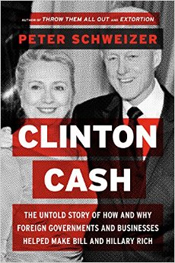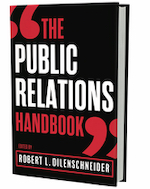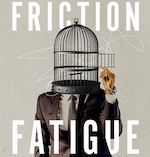When Bill and Hillary Clinton left the White House, they were, as Hillary famously said, “dead broke.” They both published bestselling memoirs and former President Clinton embarked on the lucrative lecture circuit.
 After all, this is how things are done in Washington. Those who leave office are expected to cash in on their experience and contacts. Former Members of Congress become lobbyists and retired military officers go to work for defense contractors.
After all, this is how things are done in Washington. Those who leave office are expected to cash in on their experience and contacts. Former Members of Congress become lobbyists and retired military officers go to work for defense contractors.
As Peter Schweizer details in his remarkable new book, Clinton Cash: The Untold Story of How and Why Foreign Governments and Businesses Helped Make Bill and Hillary Rich, the Clintons, and their foundation, have raised greenbacks and red flags. Never have former government officials raised so much money over a short period of time.
As Schweizer demonstrates throughout Clinton Cash, a number of those paying Bill Clinton for speeches or donating to the Clinton Foundation have agendas that are at odds with U.S. policy and interests.
Schweizer, whose earlier books served as the basis for segments on 60 Minutes, notes that the Clinton Foundation is not a typical charity. It is difficult to tell where politics and corporatism end and charity begins. It is also reported that the Better Business Bureau found that the Clinton Foundation “failed to meet the minimum standards of accountability and transparency.”
The author reveals that seventy five percent of contributions to the Clinton Foundation are contributions of $1 million or more. From 2001-08, Bill Clinton was paid $109 million in speeches. After Hillary Clinton was confirmed as Secretary of State, the number of his speeches and fees quickly escalated.
When Hillary Clinton became Secretary of State, she signed a “Memorandum of Understanding” with the administration pledging to reveal all potential conflicts of interest.
Schweizer details numerous failures to comply with the memorandum. Some of the transactions Schweizer documents involved uranium deals with Russia and nuclear technology with India.
Another example was the Keystone-XL Pipeline. Since the proposed pipeline was crossing the border between the United States and Canada, it would need a permit approved by the Secretary of State. TD Bank, one of the biggest investors in the pipeline, arranged for Bill Clinton to give a series of speeches that netted him nearly $2 million. The debate over the pipeline continued throughout Obama’s first term. Hillary Clinton left the State Department before it could be implemented.
According to Clinton Cash, it is not only the Clintons who benefit from such financial transactions. Huma Abedin, Hillary Clinton’s deputy chief of staff at the State Department (and the wife of disgraced Rep. Anthony Weiner), was able to be classified as a Special Government Employee (SGE). This enabled her to work for both the State Department, as well as the Clinton Foundation. This arrangement was also extended to other Clinton intimates.
Following the 2010 earthquake in Haiti, Bill Clinton was appointed as a “special envoy” to Haiti. In the chapter entitled “Disaster Capitalism” In every sense, Bill and Hillary Clinton were overseeing the recovery efforts. Schweizer reports that promised housing projects were never completed.
The Clintons also used their influence to help Irish telecommunications magnate Denis O’Brien enter that market. They also steered contracts to a company on whose board former Clinton White House Chief of Staff Mack McLarty served.
Schweizer acknowledges that he is not an attorney and cannot comment on the legality of the situations he reports.
Nevertheless, the reader will be aghast and will ask how their behavior could be legal and/or ethical by any standard. Many foreign nationals with whom the Clintons have been involved have been indicted/and or convicted of corruption in their home countries for activities unrelated to their activities with the Clintons.
Few books written during the 2016 presidential race will shed any real light on the issues and the personalities of the race the way Clinton Cash does. At 256 pages, this book is relatively short. However, as new stories emerge-from ABC anchor George Stephanopoulos’ $75,000 contribution to the Clinton Foundation to the foundation receiving $500,000 in order for Bill Clinton to accept an award in India, the paperback edition could double in length.
Peter Schweizer has done a great service in writing Clinton Cash. His yeoman work is a model of clarity of a largely ignored story. Regardless of how Hillary Clinton fares in the 2016 presidential race, the Clintons will be on the global stage for quite some time. Their financial activities warrant deep scrutiny.
* * *
Kevin P. McVicker is VP with Shirley & Banister Public Affairs in Alexandria, Va.


 Time correspondent Simon Shuster’s “The Showman” demonstrates how Ukraine president Volodymyr Zelensky’s masterful knowledge of PR tactics and the power of propaganda transformed him from comedian into a respected world leader.
Time correspondent Simon Shuster’s “The Showman” demonstrates how Ukraine president Volodymyr Zelensky’s masterful knowledge of PR tactics and the power of propaganda transformed him from comedian into a respected world leader. Iuliia Mendel, who served as press secretary for Ukraine president Volodymyr Zelensky from 2019 to 2021, will release a book called “The Fight Of Our Lives” in September, published by Simon & Schuster’s One Signal Publishers.
Iuliia Mendel, who served as press secretary for Ukraine president Volodymyr Zelensky from 2019 to 2021, will release a book called “The Fight Of Our Lives” in September, published by Simon & Schuster’s One Signal Publishers. Robert Dilenschneider, former CEO of Hill and Knowlton, is releasing the fifth edition of The Public Relations Handbook on Feb. 15.
Robert Dilenschneider, former CEO of Hill and Knowlton, is releasing the fifth edition of The Public Relations Handbook on Feb. 15.  Big Advertising may be down for the count, but the power of marketing lives on. That’s the big takeaway from Paul Dyer’s “Friction Fatigue,” a look at what advertising’s downward spiral means for “future-focused brands."
Big Advertising may be down for the count, but the power of marketing lives on. That’s the big takeaway from Paul Dyer’s “Friction Fatigue,” a look at what advertising’s downward spiral means for “future-focused brands." Sabrina Horn, the high-tech PR guru who sold her Horn Group to Finn Partners in 2015, has published “Make It, Don’t Fake It.”
Sabrina Horn, the high-tech PR guru who sold her Horn Group to Finn Partners in 2015, has published “Make It, Don’t Fake It.”


 Have a comment? Send it to
Have a comment? Send it to 
No comments have been submitted for this story yet.